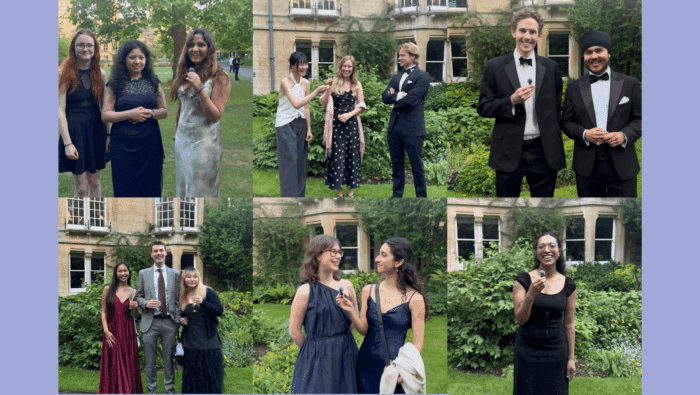
#OIIBeyondtheBooks Gives a Glimpse of Student Life at the OII and Beyond

Our Beyond the Books campaign shines a light on what makes studying at the OII so distinctive: diverse academic journeys, unexpected insights, and a shared curiosity about life online and the emerging technologies that shape it. Explore the videos below to hear directly from our community.
The Oxford Internet Institute is home to students and researchers with diverse academic backgrounds and areas of research: spanning the internet and beyond. As expected, there’s a large focus on AI-related projects.
Hannah Rose Kirk, a DPhil student studying diverse human feedback for aligning large language models, has found that even if people display a preference against anthropomorphic AI (human-like AI that is sociable, funny, and chatty as opposed to dry and robotic), they’re still more likely to be lured into engaging with anthropomorphic AI.
Bella Raja, an MSc student at the OII, is researching the environmental cost of AI. “People don’t realise that AI is relying on a lot of supply chains that are material,” she said. “I’m looking at the emissions that come from training large language models and the materiality of mining the critical minerals that go into GPUs (graphics processing units).”
Some students see the irony in some of their research approaches, with MSc student Felix Wallis describing his work using LLMs to simulate how communities evolve as “maybe a little bit Black Mirror.” Similarly, visiting research student Paul Povel is investigating what happens when people are simulated by LLMs and made to compete to maximise money and welfare.
Others spoke about research areas the public may not know about. Kayla Blomquist, a DPhil student who studies US–China AI competition, explained that people get stuck on very narrow ideas of what it means to “win” the race between the US and China.
“Actually, there are many other things we need to consider other than just specific technical accomplishments,” Blomquist added.
Students shared many reasons why they chose to study at the OII, but one answer stood out: the department’s interdisciplinary nature.
For MSc student Mimi Chen, the most important part of quantitative research is applying it,” she said. Sabrina Norwood, a Postdoctoral Researcher in Online Environments and Well-being, added: “I like to nerd out on the academic things, but also do something with that research, and I think the OII is a good place to do that.”
“I thought it was really cool to be able to study with people who are technologists and policy makers and from the law,” said Emily Fowler. Another MSc student, Joy Ward, shared that everyone has a slightly different interest in social data science and a place they want to take their research, which makes for colourful and exciting classroom conversations.
The OII isn’t just home to technologists, but students from a variety of academic backgrounds. According to Narankar Sehmi, a philosopher, being able to bring a different perspective is one of the most valuable features of the department.
Toby Drinkall, a theologian, agrees that there’s space for people with different backgrounds in the department. “I’ve done no theology at the OII, but I feel that the skills that I learned studying theology are very appreciated,” he said.
Others felt the pull to Oxford first, before discovering the OII. Ileena Irving, who is studying Social Science of the Internet and previously worked at a dating app, before joining Oxford, knew that she wanted to continue researching dating apps in the City of Dreaming Spires, which she describes as one of the most romantic places in the world.
Philipp Riederle, a DPhil student in Information, Communication and the Social Sciences, summed it up: “I’m surrounded by so many brilliant people who share my niche interest in examining the Internet from a variety of perspectives,” he said.
Explore the full #OIIBeyondtheBooks campaign at the links below.